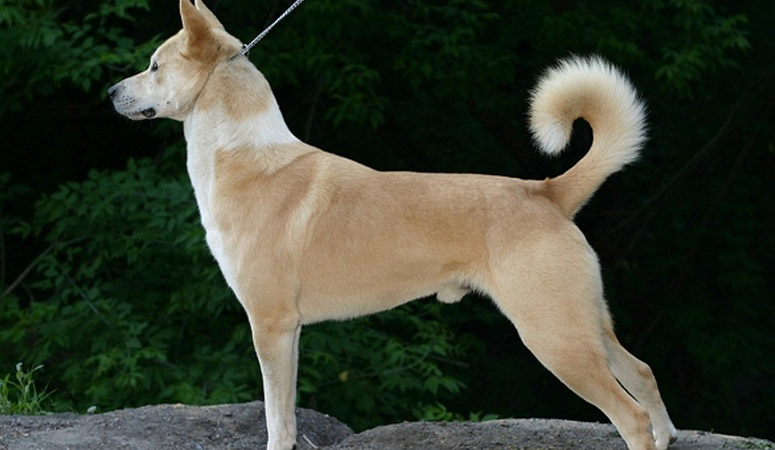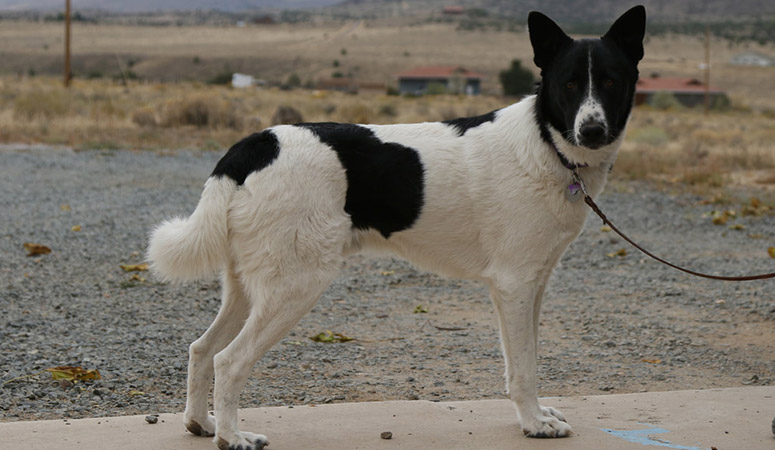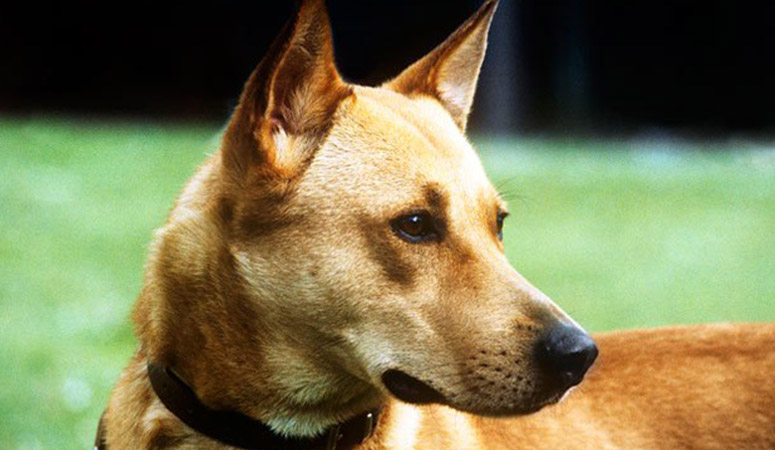Canaan Dog

The Canaan Dog has medium size and moderate substance that combines strength, agility, and endurance. They can change directions instantly with a brisk, ground-covering trot. With double coat, they can adapt to great extremes in weather ranging from hot days to cold nights. As the national dog of Israel, this breed is docile with family, but aloof with strangers. Alert and clever, they’re good guardians of flock and home.
| Other Names | Kalef K’Naani, Canaanite Dog |
| Color | Black, Cream, Golden, Liver, Red,Tan, White |
| Height | Males: 20-24 inches, Females: 19-23 inches. |
| Weight | Males: 45-55 pounds, Females: 35-45 pounds. |
| Life Span | 12-15 years |
| Personality | Confident, Alert, Vigilant |
| Exercise | Regular Exercise |
| Origin |
| Popularity | #179 |
| Groom Needs | Weekly Brushing |
| Kids Friendly | No |
| Dog Friendly | Yes with supervision |
| Watch Dog | Yes |
| Family Dog | |
| Litter Size | 5–8 pups |
Canaan Dog Pictures
Canaan Dog Video
Introduction
The Canaan Dog is also called the Palestinian Pariah Dog or the Bedouin Sheepdog. They are typically wild in appearance, with a pair of low-set ears and a wedge-shaped head. They are slightly angulated and when they walked, they did so with grace and elegance. Well, Canaan dogs are much on the alert all day long, and very inquisitive– little wonder they distrust strangers and easily get uncomfortable with a new, unfamiliar environment. Though when a Canaan Dog gets familiar with you, it can be your best friend ever, what’s more, they are loyal to their knees! Their double coat has a harsh and dense topcoat and a close and profuse undercoat. Acceptable color varieties include solid black, sandy, brown, tan, liver, white, brown, and white or, even, black and white.
Full-grown males stand 20-24 inches at the shoulder, weighing 40-55 pounds. A standard female Canaan Dog should have a height of about 18-23 inches (from shoulder to paw) and weigh in the range of 35-45 pounds. The Canaan Dog is a true member of the Herding Group. It has a lifespan of 11-15 years.
Living with Canaan Dog
The Canaan Dog has a double coat. He needs little brushing to keep it in good condition. Give it a weekly going over with a rubber curry brush or hound mitt to remove dead hair and distribute skin oils.
He requires minimal shedding during most of the year. Twice a year, the Canaan undergoes a heavier shed and more frequent brushing is necessary during that time. Canaans tend to stay clean and normally require less frequent baths than other moderately active breeds.
Check the ears on a weekly basis for signs of infection, irritation, or wax build up. And clean regularly with a veterinarian-approved cleanser and cotton ball.
Trim nails once or twice a month if your dog doesn’t wear them down naturally. Short, neatly trimmed nails keep the feet in good condition and prevent your legs from getting scratched when your Canaan enthusiastically jumps up to greet you. Handle his paws frequently — dogs are touchy about their feet — and look inside his mouth and ears.
Brush your Canaan’s teeth at least two or three times a week to remove tartar buildup and the bacteria that lurk inside it. Daily brushing is even better if you want to prevent gum disease and bad breath.
Ears should smell good, without too much wax or gunk inside, and eyes should be clear, with no redness or discharge. Your careful weekly exam will help you spot potential health problems early.
Begin accustoming your Canaan to being brushed and examined when he’s a puppy. Make grooming a positive experience filled with praise and rewards, and you’ll lay the groundwork for easy veterinary exams and other handling when he’s an adult.
Canaans require a moderate amount of exercise, but extensive exercise is not suggested. When denied an outlet to release their pent up energy, Canaans can become restless and develop various behavioral issues. Usually a couple of short walks a day or a walk plus some vigorous playtime in the backyard will satisfy his needs.
Few breeds can claim as pure a working heritage as the Canaan Dog. This dog will not be happy just sitting around. The breed exercises mind and body by participating in obedience, tracking, herding, agility, nose work, carting, coursing ability tests, and other activities that dog and owner can enjoy together.
Canaans love to dig and can make quite large excavations in a short period if left to their own devices. So you should provide them with a digging area where they can call their own or redirect the digging tendency with other activities.
However, Canaan puppies should not be given too much exercise because their joints and bones are still growing. They should not be allowed to jump up or off furniture nor should they be allowed to run up and down the stairs, which will put too much pressure on their still growing joints and limbs and cause a dog a few problems later on in their lives.
The Canaan Dog should do well on a high-quality dog food, whether commercially manufactured or home-prepared with your veterinarian’s supervision and approval. The recommended daily amount is about 1.5 to 2.5 cups, divided into two meals.
The amount of your dog diet depends on his size, age, build, metabolism, and activity level. The quality of dog food you buy also makes a difference — the better the dog food, the further it will go toward nourishing your dog and the less of it you’ll need to shake into your dog’s bowl.
Some dogs are prone to getting overweight, so watch your dog’s calorie consumption and weight level. Treats can be an important aid in training, but giving too many can cause obesity.
Clean, fresh water should be available at all times.
Learn about which human foods are safe for dogs, and which are not. Check with your vet if you have any concerns about your dog’s weight or diet.
With an average life span of 12 to 15 years, the Canaan Dog is generally healthy. But just like other dog breed, they are prone to suffer from some health conditions, such as hip and elbow dysplasia, ear infections, etc.
Not all Canaans will get any or all of these diseases, but it’s important to be aware of them if you’re considering this breed.
As with all breeds, a Canaan Dog’s ears should be checked regularly for signs of infection, and the teeth should be brushed often, using a toothpaste designed for dogs.
There are several health tests considerations specific to the breed, such as hip evaluation, elbow evaluation, patella evaluation, ophthalmologist evaluation and thyroid evaluation.
Responsible breeders test all breeding stock for conditions that can affect the breed. Regular visits to the vet for checkups and parasite control help to ensure the dog a long, healthy life.
Total Annual Cost: $2889
Cost is estimated for the first year and may vary depending on many factors, such as dog food, health care, leash, collar, licensing, possible fencing, crates, training and obedience classes, dog-walking, grooming, treats, toys, flea, tick, and heart-worm meds, microchips, etc.
The Canaan Dogs are highly intelligent and readily trained. They’re successful in performance and companion events such as earthdog, barn hunt, obedience, and agility.
The Canaan’s dense undercoat allows him to spend time outdoors in all kinds of weather, but when his people are home, he should be a housedog.
Although the dogs are adaptable to most climates and living situations, their natural drive for self-preservation and a well-developed sense of territory make them mistrustful of strange people, strange dogs, and new environments.
Early socialization and puppy training classes are a must. It should begin with the breeder and continue with the new owner and helps to ensure a well-mannered and well-adjusted dog both at home and in public.
A securely fenced yard can protect him from traffic and from altercations with other dogs. With a consistent schedule, he’s easy to housetrain. Also training sessions should always be positive, because harsh training methods will have a negative effect on the Canaan’s sensitive nature.
Sensitive, affectionate, and responsive, Canaan Dogs make devoted family companions.
History
The Canaan Dog is assumed to have taken origin many centuries ago, during the Biblical era of the Israelites, in the Land of Canaan. Some accounts state that the breed had existed amongst the Israelites, and had been an indispensable guard for their tents and livestock. This is the widely accepted account of the history of the Canaan Dog. More so, it is believed that when the Romans invaded the area some twenty centuries ago, or thereabouts, many Israelites abandoned their dogs in their flight from their homeland. The Bedouins are thought to have captured wild male pups of this breed and had trained and bred them to herd their flocks. Many artifacts of old, including archaeological excavations, have rather attempted to prove the place of origin of this breed to be ancient times’ Canaan ( covers parts of modern times’ Israel and Lebanon).
In the 1930s, there was a demand for service dogs for the Israeli Defence Force. The European dogs which were in use were rather not acclimated to working under the harsh climatic conditions in Israel. Dr. Rudolphina Menzel was granted to seek out and breed dogs which could serve the purpose much better. So, Menzel set out in search of native feral dogs of the region, and after about six months, she found her first dog. Months later, she intensified her search even further, and by 1934 she had started a breeding program. Her efforts had far-reaching benefits as she developed Canaan dogs which were even employed as war dogs for the War of Independence. After the Second World War, these dogs were trained by Menzel as guide dogs to help blind people. Canaan Dogs had probably arrived in America in the mid-1960s, and later gained an AKC (American Kennel Club) recognition in 1997.
Helpful Information
Breed Club: CANAAN DOG CLUB OF AMERICA
Breed Club Link: http://cdca.org/
Breed Club Rescue: The Canaan Dog Rescue Network
Breed Club Rescue Link: http://www.canaandogrescue.com/



